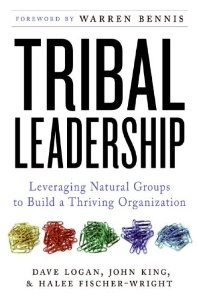It is easier to recognize a Dilbert moment than to describe one. It is the post in your day where reason and common sense are helpless to protect you from craziness in the corporate culture. It is the time where you most need help in developing as a leader. Not only do you find that you have no tools to chart a course through chaos, it is impossible to even comprehend the reason for this madness. I always blamed the corporate culture for distorting people’s priorities but recently I learned that it is much more complicated. The organization is just a reflection of the people that make it up. They operate on one of five distinct levels.
To understand Dilbert, the best model I have found comes from Tribal Leadership by Dave Logan, John King and Halee Fischer-Wright. In this model, individuals operate on one of five levels:
1.Despairing Hostility – “Life Sucks”
2.Apathetic Victim – “My Life Sucks”
3.Lone Warrior – “I’m Great – and you’re not”
4.Tribal Pride – “We’re Great – and they’re not”
5.Innocent Wonderment – “Life is great”
As an explanation, Dilbert exists in Level 2 – “My Life Sucks” and the reason his life sucks is a manager at level 3, hung up with his own glory. Dilbert is powerless to change the situation. He knows that there are others whose lives do not suck but his does. And he know that there is nothing he can do about it.
The only way out for Dilbert is to leave his current environment (job) where the deck is stacked against him and enter a new one where he can regain control of his performance and attitude. Living a level two existence makes it hard to escape. After spending some time at Level 2 it becomes hard to believe that your life doesn’t have to suck and you risk sinking to Level one where you no longer believe that life doesn’t have to suck.
When you are working at Level 2, it is unlikely that you will find anyone willing to help you and the options you have are risky both emotionally and financially. Others at Level 2 will seldom be able or willing to provide support for your escape to Level 3. You level three boss doesn’t really consider that helping you contributes anything to his greatness.
When I first wrote this post, I just made the decision to leave a work situation where I could no longer control my level. My Level 3 boss was forcing me to play a game that he designed and where he is also the scorekeeper and referee, I had spent years working under a level four boss and enjoying the satisfaction of being part of a winning team. With my new boss I was reduced to Level 2 and was getting perilously close to Level 1. Resigning was a no-brainer decision but it is not always easy to think clearly at Level 2. For a positive person who gives his best and expects to be appreciated, it is difficult to accept that someone actually wants to hurt you and will stack the deck to make it happen because it is needed for him to stay at Level 3. Reason prevailed. I did what I had to do. I fired my boss and left my level 2 work environment.
I share this not to gloat but as an example, and perhaps encouragement, to others suffering a Level 2 work environment. I hope that I can persuade you to read Tribal Leadership and learn more about the dynamic underlying the Dilbert life than you can learn from this short essay. Also, I offer encouragement that you do have some power to take back control. Don’t let yourself buy into accepting the Level 2 life. There are other options including starting your own business.

